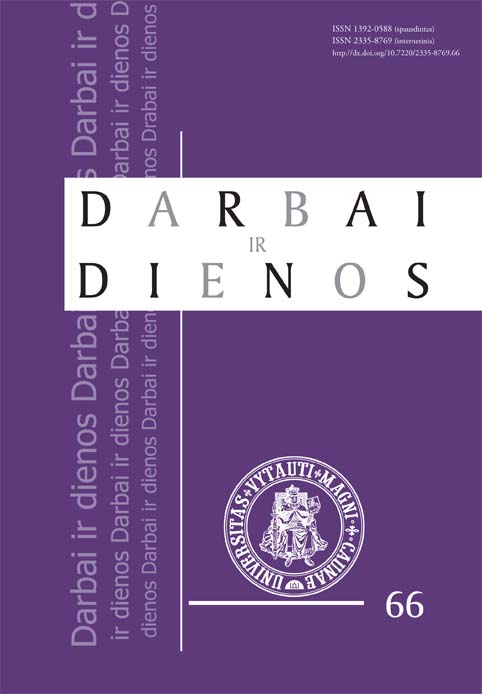Vilniaus intelektualų tautinė savivoka tarp dviejų sukilimų: retorinės atodangos
The National Consciousness of Vilnius Intellectuals between Two Rebellions: Rhetorical Exposures
Author(s): Regina KoženiauskienėSubject(s): Language studies, Language and Literature Studies, Cultural history, Ethnohistory, Social history, Nationalism Studies, 19th Century
Published by: Vytauto Didžiojo Universitetas
Keywords: Vilnius Temporary Archaeological Commission (VTAC); Vilnius Museum of Antiquities (VMA); Polszscyzna litewska; Eustachijus Tiškevičius; Adomas Kirkoras; Vladislovas Sirokomlė; Teodoras Narbutas; Teres
Summary/Abstract: The period between two rebellions (from 1831 to 1863) is chosen to highlight the national consciousness of Vilnius intellectuals. This is the period after the conflagration of the first rebellion had already died down and before the repercussions of the second rebellion had become very intense. The article discusses how the staff and supporters of the Vilnius Temporary Archaeological Commission (VTAC) and of the Vilnius Museum of Antiquities (VMA) – both at that time functioned in the buildings of the closed Vilnius University – understood both the situation of the Lithuanian language and what it means to be a Lithuanian. Along with paganism, the Lithuanian language had been lost for a long time – it survived only as a folk language; also, the union with Poland caused a shift to Polish language use generally. Though it may seem paradoxical, the members of VTAC spoke and wrote in Polish, but felt themselves to be Lithuanian and perceived the Lithuanian language not as a museum artifact, but as a living language still used by ethnic Lithuanians. They acknowledged that the Lithuanian language is not only the language of peasants, but also was the language of the dukes and the magnates of the early historical Lithuania – they knew that the names of Lithuanian dukes were purely Lithuanian and had originated from and in the Lithuanian language. Moreover, they were favorably disposed to the first intellectual works then appearing and written in the Lithuanian language. Both the author’s discussion of national and civil self-perception and her negation of the myth of the alleged “Polishness” of Vilnius intellectuals are mostly based on an analysis of the latter’s own texts. The rhetorical legacy of Vilnius intellectuals (letters, occasional speeches, mostly poetical texts) shows their feeling of national identity and its roots; their love for “the holy Lithuania, the native land”; and their concern to collect and to protect the Lithuanian heritage as well as to publish Lithuanian books.
Journal: Darbai ir dienos
- Issue Year: 2016
- Issue No: 66
- Page Range: 243-253
- Page Count: 11
- Language: Lithuanian

